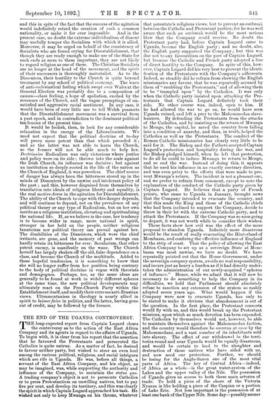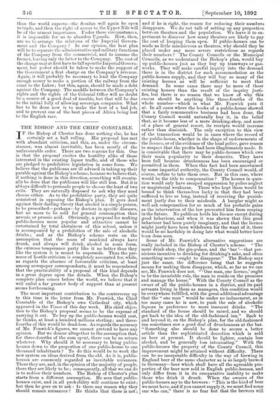THE END OF THE UGANDA CONTROVERSY. T HE long-expected report from
Captain Lugard closes the controversy as to the action of the East Africa Company and its agents in regard to the affairs of Uganda. To begin with, it is clear from his report that the assertion that he favoured the Protestants and persecuted the Catholics is quite untrue. As a matter of fact., he desired to favour neither party, but wished to steer an even keel among the various political, religious, and racial intrigues which are rife in Uganda. He was, before all things, a servant of the East Africa Company, and his object, as may be imagined, was, while supporting the authority and influence of the Company, to maintain the status quo. A trading company's object is not to persecute Catholics or to press Protestantism on unwilling natives, but to pay five per cent. and develop its territory, and this was clearly the spirit in which Captain Lugard approached his task. He wished not only to keep Mwanga on his throne, whatever that potentate's religious views, but to prevent an outbreak between the Catholic and Protestant parties; for he was well aware that such an outbreak would be the most serious blow that the Company could receive. No doubt the Protestant party had, before Captain Lugard came to Uganda, become the English party ; and no doubt, also, the English party supported the Company ; but this was due not to any favouritism on the part of Captain Lugard, but because the Catholic and French party adopted a line of direct hostility to the Company. In spite of this, how- ever, Captain Lugard did his very best to prevent the identi- fication of the Protestants with the Company's adherents. Indeed, so steadily did he refrain from showing the English missionaries any favour, that he was repeatedly accused by them of " snubbing the Protestants," and of allowing them to be "trampled upon" by the Catholics. It was only when the Catholic party insisted upon attacking the Pro- testants that Captain Lugard definitely took their side. No other course was, indeed, open to him. If he had allowed the war to go on, he would have seen. Uganda ruined, and left a prey to the Mahommedan slave- hunters. By defending the Protestants from the attacks of the Catholics, and by insisting on the return of Mwanga to Mengo, the capital, he saved the country from falling into a condition of anarchy, and thus, in truth, helped the Catholics as well as the Protestants. The conduct of the Roman Catholic missionaries has clearly very little to be said for it. The Bishop and the Fathers accepted Captain Lugard's protection and hospitality during the war, and the Bishop pledged himself, when he left that protection, to do all he could to induce Mwanga to return to Mengo, and so end the war. Instead of doing this, it appears that he used his influence in an exactly contrary direction, and was even privy to the efforts that were made to pre- vent Mwanga's return. The incident is not a pleasant one, and we prefer to refrain from comment, except to note the explanation of the conduct of the Catholic party given by Captain Lugard. He believes that a party of French priests, who came to Uganda in January, brought news that the Company intended to evacuate the country, and that this made the King and those of the Catholic chiefs who had been inclined to support the Company, decide to throw in their lot with the extreme Catholic party, and to attack the Protestants. If the Company was so soon going to depart, it was not worth while to consider their wishes..
These facts show how evil was the effect of the mere proposal to abandon Uganda. Infinitely more disastrous would be the result of really evacuating the Hinterland of Mombassa, and confining the effective influence of England to the strip of coast. That the policy of allowing the East Africa Company to set up as a sovereign State at Mom- bassa was most unwise, we have no doubt. We have repeatedly pointed out that the Home Government, under the sovereign company system, avoids no real responsibility, and incurs just as heavy a burden as if it had directly under- taken the administration of our newly-acquired " spheres of influence." Hence, while we admit that it will now be necessary to do something to help the Company in its difficulties, we hold that Parliament should absolutely refuse to sanction any extension of the system so rashly adopted seven years ago. What would happen if the Company were now to evacuate Uganda, has only to be stated to make it obvious that abandonment is out of the question. In the first place, the Protestant converts would fly with us, and this would break up the Protestant missions, upon which so much devotion has been expended. The Catholics by themselves would not, however, be able to maintain themselves against the Mahommedan faction, and the country would therefore be overrun at once by the Mahommedans, and a vast number of its inhabitants sold into slavery. The effect of our withdrawal in the terri- tories round and near Uganda would be equally disastrous, and would be certain to lead to the slaughter and destruction of those natives who have sided with us, and now need our protection. Further, we should be losing for the Anglo-Saxon one of the most vital parts of Africa. The key of Central Africa—indeed, of Africa as a whole—is the great water-system of the Lakes and the upper valley of the Nile. The possession of Uganda gives us access to both these main arteries of trade. To hold a piece of the shore of the Victoria Nyanza is like holding a piece of the Caspian or a portion of Lake Erie. Not less important is the possession of at least one bank of the Upper Nile. Some day—possibly sooner than the world expects—the Soudan will again be open to trade, and then the right of access to the Upper Nile will be of the utmost importance. Under these circumstances, it is impossible for us to abandon Uganda. How, then, are we to arrange the relations of the Imperial Govern- ment and the Company ? In our opinion, the best plan will be to separate the administrative and military functions of the Company from the commercial, and to assume the former, leaving only the latter to the Company. The cost of the change may at first have to fall upon the Imperial Govern- ment, but power should be taken to make the support of the Government a first charge on the Company's revenue. Again, it will probably be necessary to lend the Company enough money to make a portion of the railway from the coast to the Lakes ; but this, again, should be made a debt against the Company. The muddle between the Company's rights and the rights of the Colonial Office will no doubt be a source of a good deal of trouble, but that will be due to the initial folly of allowing sovereign companies. What has to be done now is to make the best of a bad job, and to prevent one of the best pieces of Africa being lost to the English race.



































 Previous page
Previous page